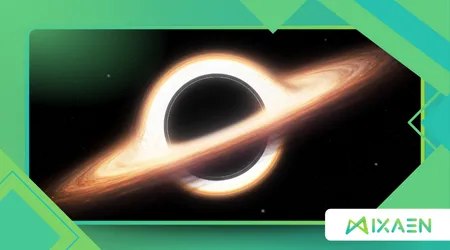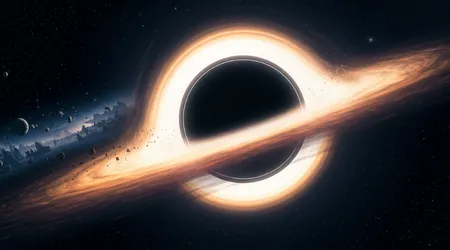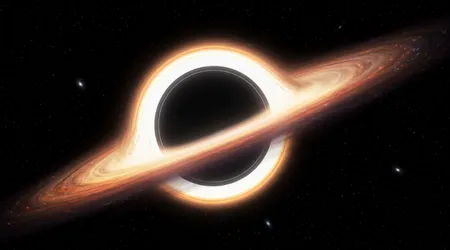Could Black Holes Be Gateways to Other Universes?

Could Black Holes Be Gateways to Other Universes? This question has long ignited the curiosity of scientists and dreamers alike.
Anúncios
Black holes, those enigmatic cosmic titans, are regions where gravity is so intense that not even light escapes.
Yet, beyond their reputation as devourers of matter, a tantalizing hypothesis persists: could these celestial voids serve as portals to other realms?
This idea, rooted in theoretical physics, challenges our understanding of space, time, and reality itself.
In 2025, groundbreaking research, like that from the University of Sheffield, continues to probe this mystery, blending quantum mechanics and general relativity to explore what lies beyond the event horizon.
This article delves into the science, speculation, and profound implications of black holes as potential cosmic gateways, inviting you to ponder the universe’s deepest secrets.
The allure of black holes lies in their paradoxical nature. They are both destructive and creative, swallowing stars while possibly birthing new universes.
Advances in observational tools, such as the James Webb Space Telescope (JWST), have fueled speculation about their role in cosmic connectivity.
This exploration isn’t just academic it reshapes how we view our place in the cosmos. Are we part of an intricate multiverse, linked by these gravitational behemoths?
Let’s journey through the science, theories, and unanswered questions to uncover whether Could Black Holes Be Gateways to Other Universes? holds truth.
The Nature of Black Holes: Cosmic Enigmas Unraveled
Black holes form when massive stars collapse, creating a gravitational pull that warps spacetime. Their event horizon marks the point of no return.
Beyond it lies the singularity, where physics as we know it falters. The sheer density defies comprehension, compressing matter into an infinitesimal point. This makes black holes prime candidates for exotic phenomena, including gateways to other realms.
The concept of Could Black Holes Be Gateways to Other Universes? stems from their ability to distort spacetime. General relativity, Einstein’s 1915 masterpiece, predicts black holes bend the cosmic fabric, potentially linking distant regions or universes.
Observations of Sagittarius A, the Milky Way’s supermassive black hole, reveal its immense influence, with a mass 4.3 million times the Sun’s.
++ Why Some Galaxies Don’t Seem to Have Dark Matter at Al
Yet, black holes aren’t just static voids. Rotating (Kerr) black holes could create ring singularities, theoretically allowing passage without crushing matter.
This idea fuels speculation about traversable pathways. However, the extreme conditions inside raise doubts about survival. Could quantum effects soften these singularities, enabling cosmic travel?
The interplay of gravity and quantum mechanics drives this hypothesis. Unimodular gravity, a twist on Einstein’s theory, suggests singularities might be replaced by quantum fluctuations.
This could transform black holes from endpoints into doorways, challenging our view of their finality. The mystery deepens as we explore these possibilities.

Wormholes: Cosmic Tunnels or Science Fiction?
Wormholes, or Einstein-Rosen bridges, are theoretical shortcuts through spacetime, first proposed in 1935. Could they connect black holes to other universes?
A black hole might form one end of such a tunnel, with a white hole a hypothetical opposite ejecting matter elsewhere. This idea captivates physicists exploring Could Black Holes Be Gateways to Other Universes?
The catch? Wormholes require exotic matter with negative energy to stay open, a substance yet to be observed. Without it, they collapse instantly.
Also read: Are There Stars Made Entirely of Dark Matter?
Nikodem Poplawski’s 2010 theory suggests torsion, a repulsive gravitational force, could stabilize these tunnels, preventing singularity formation. This could allow matter to pass through.
Recent studies, like those in 2025’s Physical Review Letters, propose quantum effects might smooth singularities, supporting wormhole stability.
Yet, no direct evidence exists. The Event Horizon Telescope’s 2019 black hole image intensified interest, but wormholes remain speculative. Could technology one day detect these cosmic bridges?
The multiverse theory adds intrigue. If our universe is one of many, black holes might link them. Imagine a cosmic subway system, with black holes as stations.
Read more: The Great Silence: Why the Universe Isn’t Responding to Us
This analogy sparks wonder: could we ever board such a train? The challenge lies in testing these ideas without direct access.
| Aspect | Black Hole | Wormhole |
|---|---|---|
| Definition | Region where gravity traps light | Theoretical tunnel through spacetime |
| Formation | Stellar collapse or gas collapse | Hypothetical, requires exotic matter |
| Evidence | Observed via gravitational effects | No direct evidence, purely theoretical |
| Role in Universe | Absorbs matter, warps spacetime | Potential link to other universes |
The Multiverse and Black Holes: A Cosmic Connection
The multiverse theory posits countless universes with unique physical laws. Black holes could serve as gateways, transferring matter or information between them.
Stephen Hawking’s work on the holographic principle suggests information isn’t lost but preserved on the event horizon, possibly sent elsewhere.
In 2025, JWST findings revealed galaxies rotating uniformly, hinting our universe might exist inside a black hole from a parent universe.
This supports Poplawski’s “Big Bounce” theory, where torsion prevents singularities, birthing new universes. Could Could Black Holes Be Gateways to Other Universes? explain our cosmic origins?
This idea reshapes cosmology. If every black hole spawns a universe, we’re part of an infinite cycle. Imagine a tree, each branch a universe sprouting from a black hole’s seed. This perspective challenges the Big Bang as a singular event, suggesting a continuous process.
However, skepticism persists. Torsion remains unobserved, and exotic matter’s existence is uncertain.
Critics argue these theories overcomplicate cosmology without empirical support. Still, the philosophical implications are profound: are we one of many realities, connected by black holes?
The multiverse hypothesis also raises practical questions. Could intelligent life traverse these gateways? The extreme gravity likely destroys matter, but energy or information might survive.
Future telescopes, like NASA’s Roman Space Telescope, may offer clues by studying cosmic explosions.
Challenges and Limitations: The Reality Check
Despite the allure, Could Black Holes Be Gateways to Other Universes? faces significant hurdles. The crushing gravity inside a black hole would likely obliterate any traveler.
Even if wormholes exist, stabilizing them requires exotic matter, which defies current physics. These barriers temper optimism.
Quantum gravity, merging relativity and quantum mechanics, might hold answers. A 2025 study in Physical Review Letters suggests quantum effects could resolve singularities, but no complete theory exists.
Without it, wormhole stability remains speculative. Can we ever test these ideas experimentally?
Observational challenges persist. Black holes are detected indirectly via gravitational effects or accretion disks, not direct wormhole evidence.
The JWST’s 2025 discoveries, like rotating galaxies, hint at cosmic connections, but definitive proof is elusive. Technology lags behind theory.
Consider a spaceship approaching a black hole, like in the sci-fi novel Ring by Stephen Baxter. The crew might encounter a ring singularity, but tidal forces would shred them. This example underscores the practical impossibility of traversal. Are we chasing a cosmic dream?
Philosophically, the idea intrigues but frustrates. If black holes lead elsewhere, could we ever return?
Hawking noted that any passage would likely be one-way, severing ties with our universe. This raises a question: is exploration worth such a sacrifice?
The Future of Black Hole Research: What Lies Ahead?

Advancements in 2025, like the JWST’s deep-space observations, push boundaries. Detecting uniform galaxy rotation suggests black holes’ broader cosmic role.
Future missions, like the Roman Space Telescope, aim to study 100,000 cosmic explosions, potentially revealing black hole secrets.
Theoretical progress continues. Unimodular gravity, explored in 2025, ties dark energy to black hole interiors, hinting at new physics.
Could this resolve the singularity problem? Researchers are optimistic, but empirical evidence is crucial. The search for truth persists.
Imagine a probe, like a futuristic Voyager, designed to withstand a black hole’s gravity. It detects quantum fluctuations, signaling a wormhole.
This original scenario inspires hope, but current technology falls short. What breakthroughs await to unlock these mysteries?
The philosophical stakes are high. If Could Black Holes Be Gateways to Other Universes? proves true, it redefines existence.
Are we part of a cosmic network, with black holes as nodes? The question lingers, driving science forward with relentless curiosity.
Conclusion: A Universe of Possibilities
Could Black Holes Be Gateways to Other Universes? remains a question that blends science, imagination, and philosophy.
Black holes, once thought to be cosmic dead ends, now spark debate about multiversal connections. From Hawking’s holographic principle to Poplawski’s Big Bounce, theories abound, yet proof remains elusive.
The JWST’s 2025 findings, revealing 70% of early galaxies rotating uniformly, challenge traditional cosmology, suggesting our universe might stem from a black hole.
This exploration isn’t just about physics it’s about humanity’s quest to understand our place in the cosmos. Like explorers charting unknown seas, scientists probe black holes for answers.
The idea of cosmic gateways captivates, but challenges like exotic matter and quantum gravity loom large. Will we ever cross these thresholds? The journey continues, fueled by wonder and discovery.
Frequently Asked Questions
Can black holes really connect to other universes?
The idea is theoretical, based on wormholes and multiverse theories. No direct evidence exists, but 2025 studies suggest quantum effects might enable connections.
What would happen if you entered a black hole?
Extreme gravity would likely destroy you. However, theoretical ring singularities might allow passage, though survival remains unlikely without exotic matter.
